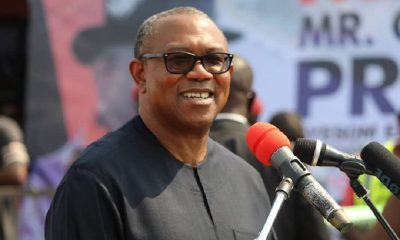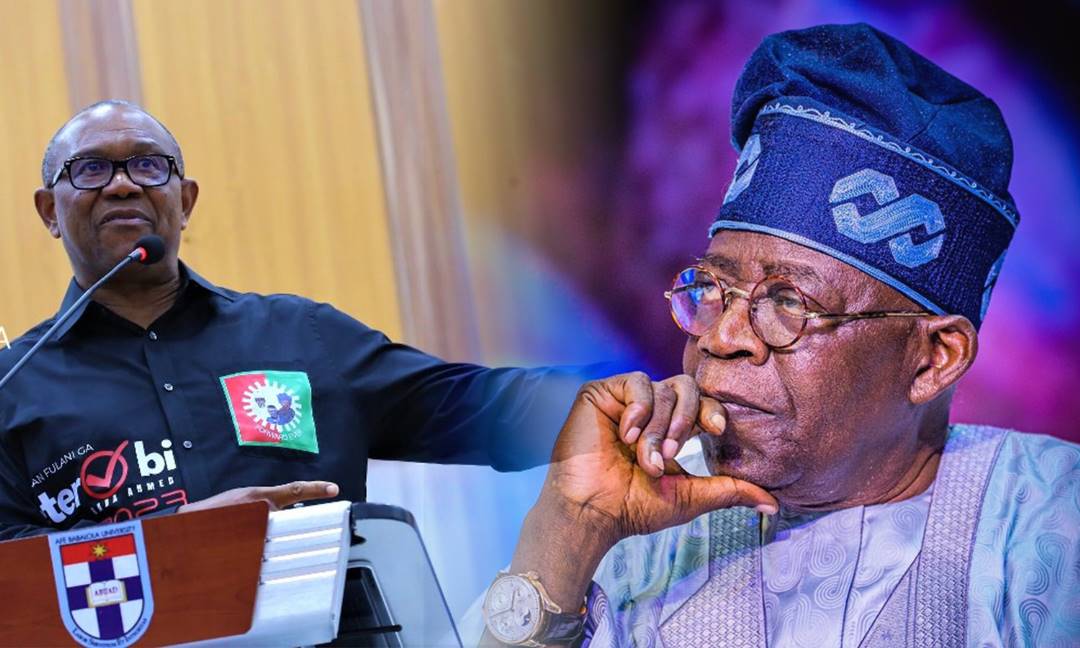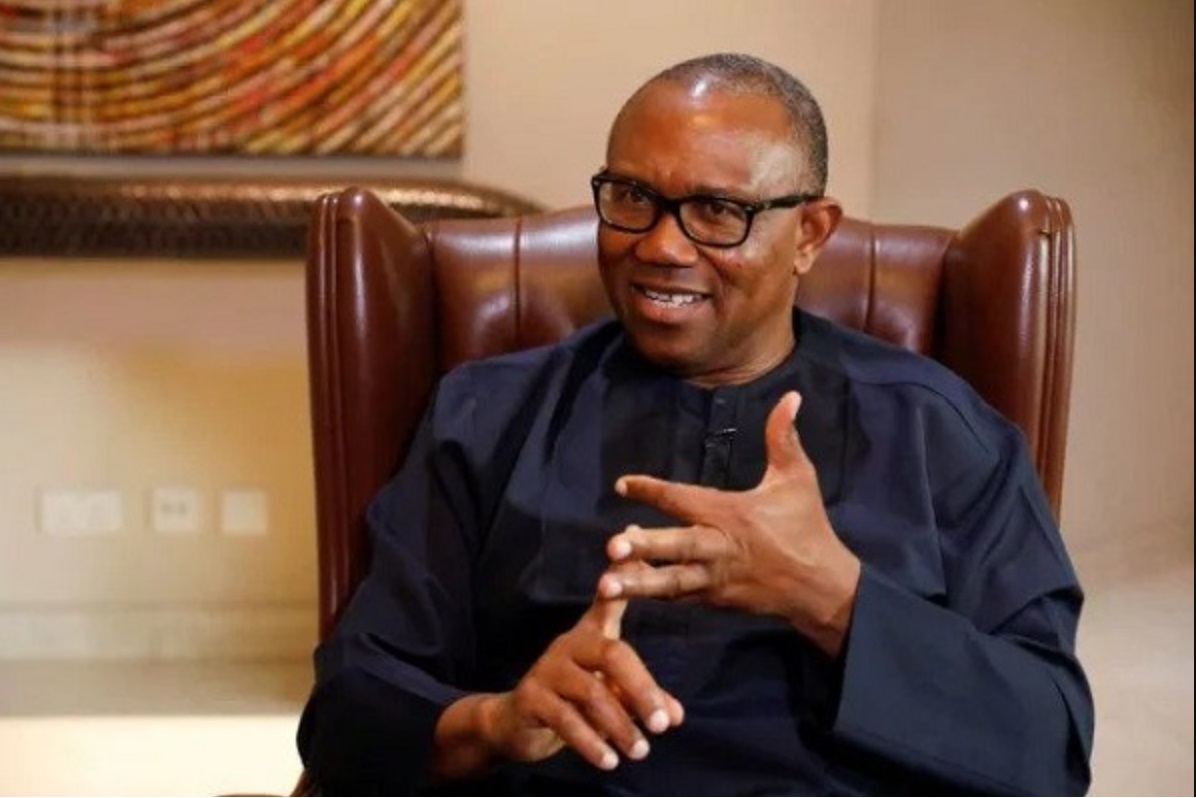Education
Who Will be Peter Obi’s Minister of Education?

By Akachukwu Ifeanyichukwu
The public education sector of Nigeria is currently in a critical state as staff unions of federal universities have been on an unending industrial action for the last five months.
Federal institutions are dilapidated as they are poorly funded and the approved funds are rarely used for the approved task. If elected on February 25, 2023, the Peter Obi-Yusuf Datti Baba Ahmed-led administration will have to face the uphill task of rebuilding the sector from the foundation and this would be done by who he appoints as the Minister of Education if he is given the mantle of leadership.
During his tenure as Governor of Anambra State, Peter Obi revitalized the education system of the state using strategic partnerships with the United Nations Development Programme (UNDP), the United Nations International Children’s Emergency Fund (UNICEF), the World Bank, the Department for International Development (DFID) of the United Kingdom and the European Union (EU).
The state was the first to procure and distribute more than 30,000 computers to secondary schools, including 22,500 from Hewlett-Packard (HP).
The Managing Director for the Personal Systems Group at HP described the deployment as the biggest of such projects in the Middle East and Africa.
The Anambra State Government provided Microsoft Academies to more than 500 secondary schools, which the Head of Microsoft in Nigeria described as the biggest such deployment in Africa so far.
The State provided Internet access to more than 500 secondary schools, which were characterized by the Director of Galaxy Backbone as “incomparable to any in the country.”
More than 700 buses were given to secondary schools in the state by the government. Boreholes were provided in schools all over the state and lastly, numerous classrooms were built in all the 177 communities of the state. This led Obi to receive awards from the United Nations Development Programme (UNDP), Bill and Melinda Gates Foundation, and other prestigious organizations.
Here is a short list of the qualified members of the Nigeria Academia for the possible post of Minister of Education:
Emeritus Professor Umaru Shehu (North)
A must-know name in the Northern region of Nigeria is Professor Umaru Shehu, a distinguished physician, academic, and administrator, who is the chairman of the Board of Directors of the Institute of Human Virology, Nigeria (IHVN).
Professor Shehu, who was educated at the University of Ibadan and Liverpool, is a distinguished fellow of the National Postgraduate Medical College. He was a pro-Vice-Chancellor (Academic) of the Ahmadu
Bello University, Zaria from 1977-1978.
From 1978-1980, he was the Vice Chancellor of the University of Nigeria, Nsukka and Chairman of the board of management of the University College Hospital (UCH), Ibadan between 1991 and 1994. He was also Pro-Chancellor and Chairman, Governing Council of the Bayero University, Kano, and the University of Lagos between 1993 and 1999. He has also chaired the boards of the National Agency for the Control of AIDS (NACA) and STOPAIDS.
A one-time president of the Academy of Science and consultant to the World Health Organization (WHO), Professor Shehu holds the prestigious national award of the Commander of the Federal Republic (CFR). A world-renowned scholar with many publications to his credit and membership in international and local professional bodies, Professor Shehu is a Professor Emeritus of Community Medicine, at the University of Maiduguri, Nigeria.
Professor Kayode Adebowale (West)
A popular name in the Western academia of the country is Kayode Oyebode Adebowale, a Nigerian professor and scientist and the 13th Vice-chancellor of the University of Ibadan. In October of 2021, he became the Vice-Chancellor of the University of Ibadan, having formerly served as the deputy vice-chancellor (administration) of the school and as the Dean of the Faculty of Science in the same institution.
Prof Kayode Adebowale was born on January 11, 1962, and he is a native of the Gateway State, Ogun, in Western Nigeria. He had his primary education at St. Marks Primary School, Oke-Ijaga, Ijebu Igbo between 1967 and 1972 while his secondary was at Ayedaade Grammar School, Ikire between 1973 and 1978. He bagged his BSc in Chemistry in 1984 from the University of Ibadan at the age of 22. He received his Master’s degree and PhD from the same university in 1986 and 1991 respectively. He began his academic career as a Graduate Assistant at the University of Ibadan and became a professor of Industrial Chemistry in 2006.
He was once a lecturer at the Federal University of Technology. He has a record number of 137 published and peer-reviewed scientific papers, 14 conference papers, and 3 technical reports. He was formerly the Deputy Vice-Chancellor (Administration), at the University of Ibadan.
Professor Aniebiet Inyang Ntui (South-South)
A name strongly involved in Nigerian academia is that of Professor Aniebiet Inyang Ntui, an international author in the field of Library and Information Science and the current university librarian of the University of Calabar.
Ntui holds a BSc (Ed), Dip (Computer Techniques), M.Ed., MLS, and a PhD in Library and Information Science. She has over 20 years of experience in the library and classroom of the University of Calabar, Nigeria. Professor Aniebiet is an Associate of the European Union Research Initiative – Europeana, the University of the West of Scotland’s Centre for African Research on Enterprise and Economic Development, and the University of Glasgow’s UK-COP 26 Universities Climate Network. She is also a Fellow of various international library associations and institutions. She has served as a Consultant of Information Management to the United Nations Educational, Scientific and Cultural Organization, United Nations Development Programme, and the World Bank. She is a recipient of the Nigerian Library Association, the 2020 Award of Excellence, and the 2021 Award of Honour for her contributions to the development of librarianship in Nigeria.
She is one of the Most Read Researchers in Nigeria according to information available on the Web of Science Site.
Who do you think will eventually become a member of the Obi-Datti cabinet if he is eventually elected as President of Nigeria?
Education
Hallos Launches Learning247 Summit

By Adedapo Adesanya
Live-learning and creator-economy platform, Hallos, as part of its expansion drive, has unveiled plans to equip millions of youths and women with digital skills and monetisation opportunities through the Learning247 Hallos Summit, aimed at integrating Nigeria’s South-East into the rapidly expanding global creator economy.
At a sensitisation and stakeholder engagement forum in Enugu, the organisation also called for stronger strategic partnerships with government agencies, educational institutions, development organisations, media houses and private-sector stakeholders to advance the creator economy as a credible engine for mass employment, youth prosperity and inclusive economic growth.
The chief executive of Hallos, Mr Alexander Oseji Uzoma, renewed the call for increased investment in internet penetration, reliable power supply, digital infrastructure, creative studios and youth-focused innovation hubs across Nigeria, especially the South-East.
Describing the creator economy as one of the most accessible and scalable employment frontiers globally, he noted that with basic tools such as a smartphone, internet access and creative skills, young people can build audiences, monetise knowledge and generate sustainable income without heavy capital investment or long career pathways.
According to Mr Uzoma, the creator economy offers low-barrier entry into diverse professions, including content creation, social media influencing, live tutoring and digital coaching, video production, podcasting, graphic design, music and performance arts, digital marketing, merchandise design, e-commerce and community management. These activities support a broader value chain spanning production, distribution, technology and management.
The Hallos co-founder also explained that global projections place the creator economy in the hundreds of billions of dollars, with millions of creators worldwide earning sustainable incomes, stressing that Hallos is focused on localising these opportunities to ensure African youths can participate meaningfully and compete globally.
He further noted that Hallos operates a live-learning and creator-focused platform that integrates education, gamified quizzes, merchandising and voluntary fan donations into a single ecosystem. Through the platform, creators can host live learning sessions and masterclasses, earn from quizzes and challenges, sell branded merchandise, receive voluntary donations, build communities around their expertise and organise monetisable podcasts.
Mr Uzoma said the creator economy, driven by social media platforms, streaming services, digital commerce and content monetisation tools, has evolved into a major global industry capable of generating wealth, creating jobs and expanding export earnings.
He stressed that social media should no longer be viewed as a recreational space but as a viable business environment for wealth creation.
“The focus should not just be on content creation alone but on building businesses around content. It is about value creation and structured digital entrepreneurship,” he said.
He disclosed that Hallos intends to reach about 10 million youths nationwide, with over 5,000 already engaged across its programmes, while placing strong emphasis on bridging the gender gap by empowering women and girls through targeted digital training, mentorship and access to monetisation platforms.
As the digital economy continues to expand, Hallos said the creator economy stands out as a practical and scalable solution to youth unemployment, offering low entry barriers and global earning potential.
The company reaffirmed its commitment to bridging the gap between talent and income, enabling young Africans to earn well above minimum wage through creativity, knowledge and structured participation in the global digital economy.
Education
Bayero University PG Students to Enjoy Dangote’s N1.5bn Scholarship

By Modupe Gbadeyanka
Post-graduate students of Bayero University Kano (BUK) will benefit from a scholarship worth about N1.5 billion from the Aliko Dangote Foundation (ADF).
The businessman put down the funds to support eligible MBA, entrepreneurship, and management postgraduate students of the institution under an initiative known as MHF Dangote Graduate Business Scholarship.
At a ceremony on Tuesday, the foundation and the school signed a Memorandum of Understanding (MoU) at the auditorium of the Dangote Business School, Kano.
The deal is to provide N300 million annually over five years as scholarship awards to the beneficiaries, who will receive N150,000 each per session, beginning with the 2024/25 academic session. This is equivalent to 50 per cent of the current N300,000 fee paid by the post-graduate students. There are 1,225 students in the Business School (696 fresh and 529 returning students).
One of the beneficiaries, Mr Khalid Bababubu, who is into manufacturing and specialises in MBA, Finance and Investment, thanked the organisation for the gesture.
“We are happy to be beneficiaries of this initiative. Education is the bedrock of national development, and we will not take this scholarship for granted,” he said.
A representative of ADF, Ms Mariya Aliko Dangote, said, “Our vision at the Foundation is to build human capital that translates into economic opportunity.
“Strengthening business and entrepreneurship education is critical to turning knowledge into enterprise, innovation, and jobs. This scholarship deepens our commitment to Dangote Business School by investing directly in the next generation of business leaders and change-makers.”
On his part, the Vice Chancellor of Bayero University Kano, Prof. Haruna Musa, said, “This support comes at a critical time for many families. Beyond financial relief, it strengthens the Business School’s role as a centre for developing entrepreneurial and management talent, particularly for women who are increasingly taking leadership roles in enterprise.”
It was explained that newly admitted students will receive automatic tuition reductions during registration, and returning students who have already paid in full will receive rebates. The N300 million allocation is structured to cover all eligible postgraduate students based on current enrolment capacity.
Any unutilised balance in the first year will be retained within the Dangote Business School development envelope to strengthen learning infrastructure and digital academic capacity, ensuring continued enhancement of the academic environment.
The MHF Dangote Graduate Business Scholarship is distinct from ADF’s recently announced nationwide STEM education interventions.
Education
Entries for InterswitchSPAK 8.0 Begin, Over N40m up for Grabs

By Aduragbemi Omiyale
Senior secondary school students across Nigeria have been invited to apply and demonstrate their academic excellence on a national stage in the eighth edition of the prestigious national science competition known as InterswitchSPAK.
The contest is organised by Interswitch, Africa’s leading technology company focused on creating solutions that enable individuals and communities prosper.
Registration for InterswitchSPAK 8.0 via www.interswitchspak.com has opened and will close on Friday, May 24, 2026. For the first time, in addition to group registrations through schools, parents can also register their individual children for the competition.
This year’s edition features a scholarship pool exceeding N40 million, with Interswitch expanding the prize structure to ensure broader impact.
The overall winner will receive a N15 million tertiary scholarship, including monthly stipends. The first runner-up will be awarded a N10 million scholarship, including monthly stipends; while the second runner-up will receive a N5 million scholarship, also including monthly stipends. All scholarships are payable over 5 years. Also, the top 9 finalists will all receive brand new laptops and other exciting prizes.
In addition to the top prizes, Season 8 introduces enhanced rewards for student finalists ranked 4th to 9th, as well as increased recognition for teachers supporting qualifying students from 1st to 9th place. This expanded structure reinforces Interswitch’s commitment to rewarding academic excellence and recognising the critical role educators play in shaping student success.
“At Interswitch, we strongly believe that Nigeria’s future will be shaped by how well we nurture today’s young minds. InterswitchSPAK goes beyond competition; it is a long-term commitment to empowering students and supporting teachers who are laying the foundation for innovation, problem-solving, and national development.
“As we launch Season 8, we remain focused on creating opportunity, rewarding merit, and inspiring excellence across Nigeria,” the Executive Vice President for Group Marketing and Communications at Interswitch, Ms Cherry Eromosele, said.
Designed to empower young minds in the Science, Technology, Engineering, and Mathematics (STEM) areas, InterswitchSPAK identifies, nurtures, and rewards students while equipping them with the skills and knowledge required to excel in STEM fields and drive innovation.
Over the past seven seasons, InterswitchSPAK has positively impacted thousands of students across the country, offering full university scholarships, mentorship opportunities, and national recognition for outstanding academic performance.
Beyond these rewards, the programme has consistently reinforced the importance of STEM education as a critical driver of innovation, problem-solving, and sustainable national development.
Through a transparent, technology-enabled selection process, InterswitchSPAK has also promoted educational equity by providing students from diverse socio-economic backgrounds with equal access to opportunity, ensuring that performance and merit remain central to success.
-

 Feature/OPED6 years ago
Feature/OPED6 years agoDavos was Different this year
-
Travel/Tourism10 years ago
Lagos Seals Western Lodge Hotel In Ikorodu
-

 Showbiz3 years ago
Showbiz3 years agoEstranged Lover Releases Videos of Empress Njamah Bathing
-

 Banking8 years ago
Banking8 years agoSort Codes of GTBank Branches in Nigeria
-

 Economy3 years ago
Economy3 years agoSubsidy Removal: CNG at N130 Per Litre Cheaper Than Petrol—IPMAN
-

 Banking3 years ago
Banking3 years agoSort Codes of UBA Branches in Nigeria
-

 Banking3 years ago
Banking3 years agoFirst Bank Announces Planned Downtime
-

 Sports3 years ago
Sports3 years agoHighest Paid Nigerian Footballer – How Much Do Nigerian Footballers Earn



















